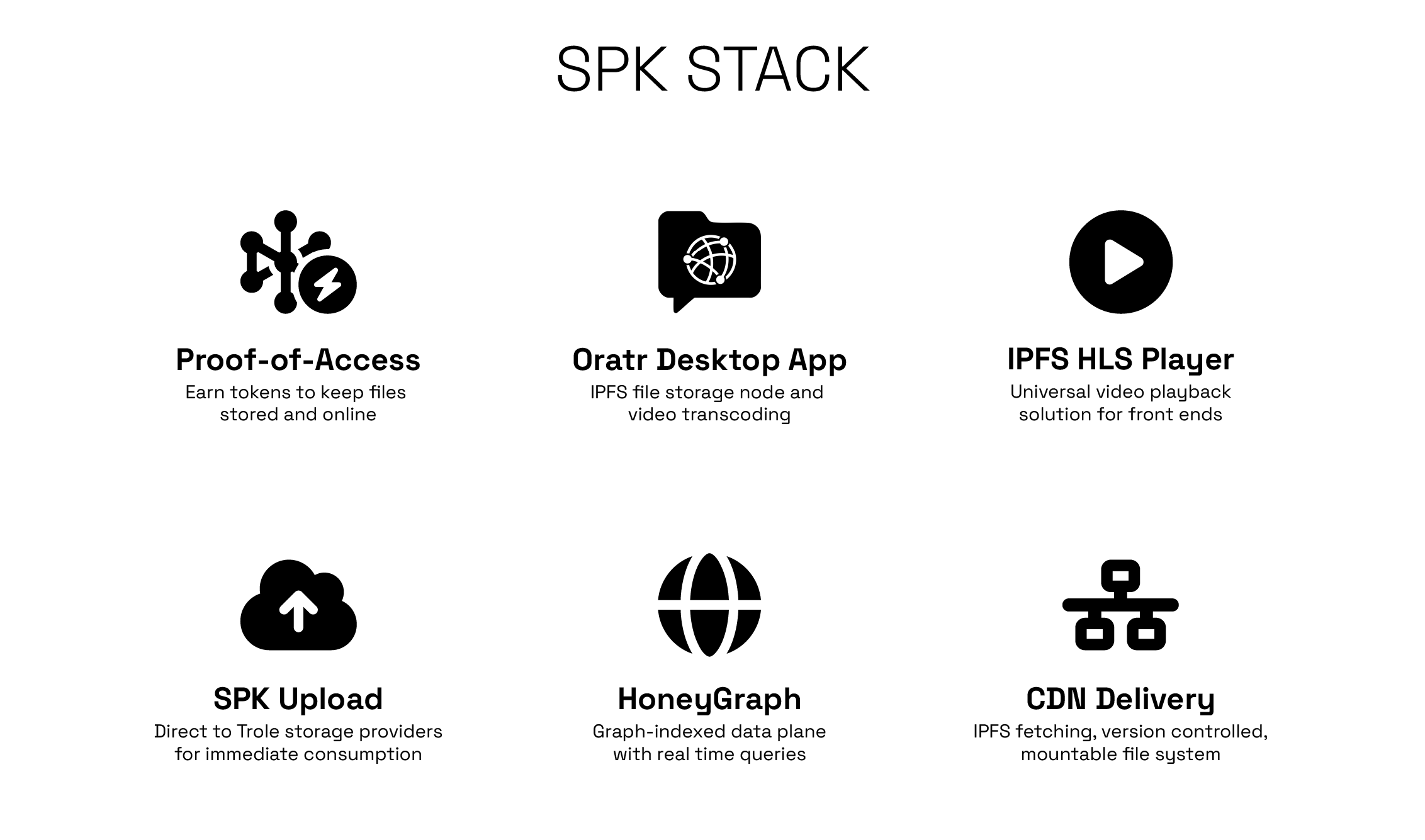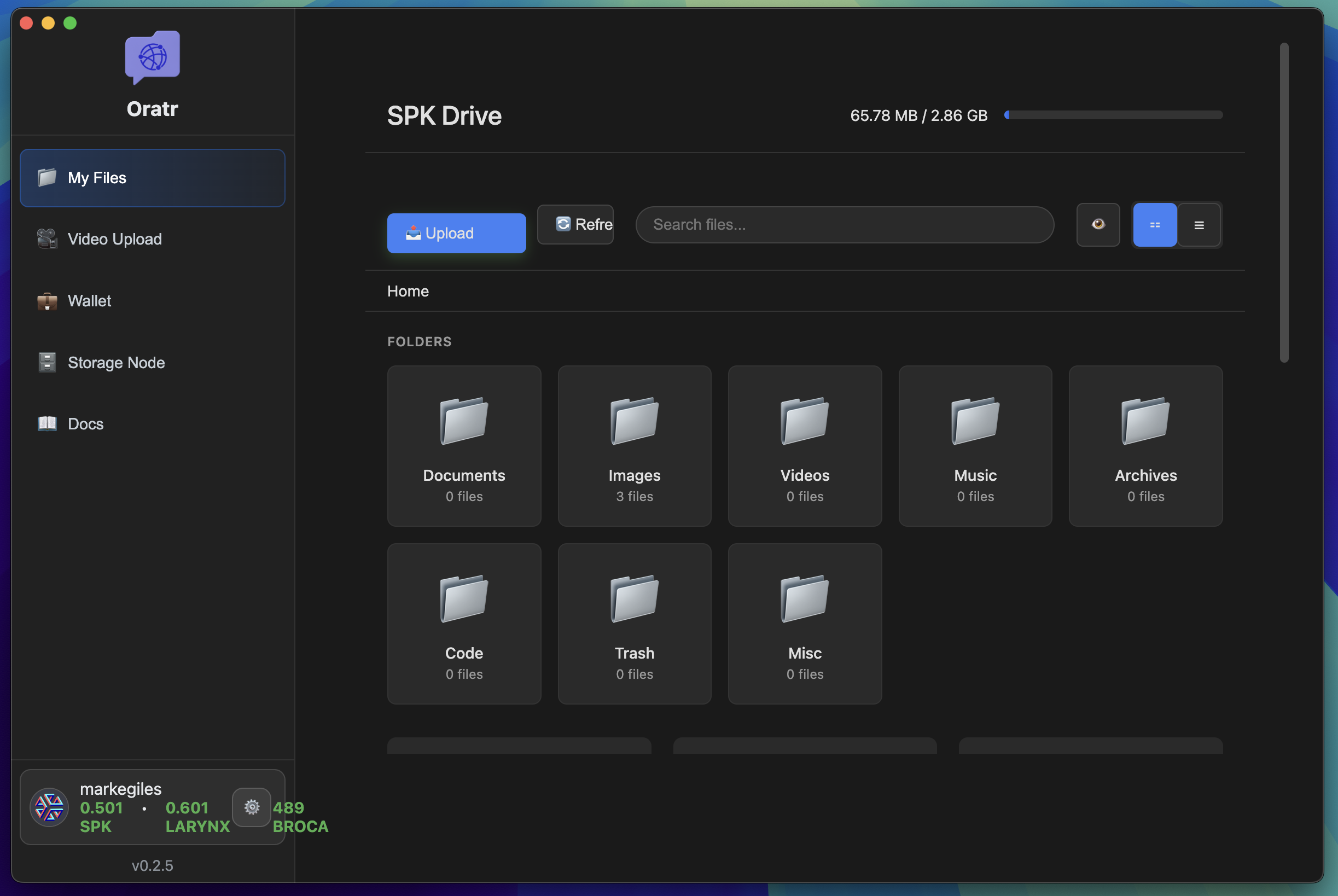Shipping the SPK Stack on Hive — DHF Proposal for Finalization and Launch

TL;DR: We are requesting back payment for work completed on SPK Network. To date, we have test releases of Oratr Desktop App, Proof-of-Access, Trole, and Honeycomb v2 with HoneyGraph. Together they unlock arbitrary file upload, end‑to‑end encrypted storage, a CDN for IPFS content with instant access to the storage provider, and an arbitrary service registration/indexing layer—plus full L2 smart‑contract capabilities. The work is largely done. With DHF support, we can productionize, document, and operate this stack so it doesn’t drift into abandonware and instead becomes a durable public good for Hive.
Why this matters to Hive
- Durable storage + delivery: Native IPFS upload paths, integrity guarantees (Proof of Access), and a CDN layer for fast reads.
- Private built in: End‑to‑end encrypted storage for user data and app payloads.
- Composable services: Register, discover, and index arbitrary services on top of Hive via SPK.
- Programmable L2: Honeycomb v2 + HoneyGraph provide a robust L2 execution and data plane (tokens, NFTs, PoB, contracts, real‑time APIs).
- Unlocks new apps: Media apps, collaborative tools, drive‑like experiences, data marketplaces, and dApps that need low‑latency reads with verifiable persistence.
What’s already built (test releases)
- Oratr: End User SPK Network Desktop App. Mac Windows and Linux. Earn just for keeping your computer online. Includes internal IPFS node or connection to an external IPFS node like the IPFS Desktop App.

-
ipfs-hls-player: An all in one video-js player solution for upgrading video playback to support HLS with CID playlists to support direct IPFS links. Transcode videos to HLS locally in browser at dlux-io, or use the Oratr app.
-
Proof of Access: A decentralized IPFS file checker that verifies content availability using SPK proofs, aligning incentives with persistence.
- spk-js: The portable SPK Network interface, allowing any Hive front-end, or JavaScript environment to interact with SPK Network.
- Trole: The Server suite of SPK Network, allowing uploads from anywhere, and running the DPoS PoA Validation software.
- Honeycomb v2 + HoneyGraph: Layer‑2 services, smart contract platform, token/NFT/PoB primitives, and a graph‑indexed data plane with real‑time queries.
- CDN + dApp hosting (dapp-server): SEO metadata, IPFS fetching, and safe app isolation via custom subdomains to mitigate XSS, enabling a proper content delivery network for apps and media.
Collectively, these components form a cohesive stack that upgrades Hive’s app surface from “content and keys” to “content, compute, storage, and services.”
Capabilities this unlocks
- Arbitrary file upload (direct and managed paths)
- End‑to‑end encrypted file storage (private data, shared spaces)
- CDN‑backed distribution for IPFS media and dApps
- Service registration and indexing (discoverable, queryable services)
- L2 smart contracts and token mechanics via Honeycomb/HoneyGraph
- Real‑time subscriptions and graph queries for dApp UX
Why DHF support now
The heavy lifting is complete. What’s left is production hardening, documentation, operations, and long‑term stewardship. Without DHF support, this near‑finished stack risks becoming abandonware—wasting a unique opportunity to materially expand what can be built on Hive.
What we will deliver with DHF funding
- Security & resilience: End‑to‑end review, threat modeling, hardening, and backup/restore drills; proactive monitoring and SLOs.
- Developer experience: Comprehensive docs, quickstarts, example apps, SDK polish, and CI templates; reproducible test/dev setups.
- Governance & process: Clear policies for upgrades, change management, and deprecation; public roadmaps and changelogs.
- Ongoing maintenance: Triage, bug fixes, minor features, dependency hygiene, and transparent weekly reporting.
Proposed scope, timeline, and budget
We propose a focused 30‑day window to finalize, launch, and transition into steady‑state operations.
Request: 10,000 HBD/day for 30 days (total 300,000 HBD) as a one‑time catch‑up for unpaid labors, and to carry the project through testing and wide release.
Financial context: Our last honeycomb proposal fell behind, resulting in roughly 350 HBD/day out‑of‑pocket for 5–6 months to labor and keep infrastructure online. - The SPK Network proposal has been unfunded for ~18 months (originally ~5,500 HBD/month to @disregardfiat), creating a maintenance and delivery backlog across ingest, PoA, and DX. - Despite numerous contributions, @markegiles has never directly been paid for his consistent work on SPK Network.
Payments - @disregardfiat payments information: - ~$54,843 For SPK Network in total * 42 months @ $5,500 would be ~$231,000 * Work could have been faster with the right help. But that also would have cost. * ~$42,000 For Honeycomb this FY * Out of $66,000 - @markegiles payments received: * $0 For SPK Network * ~$31,500 For Honeycomb this FY * Out of $49,500
This one‑time catch‑up aligns funding with work already delivered and de‑risks the GA launch without committing the DHF beyond the 30‑day window.
If we recoup prior losses during this window, we will continue the project through release and return after release for a maintenance proposal, or utilize a proposal system built in to SPK Network.
Milestones and acceptance criteria
- M1 — Rolling documentation and recipes: Continued release of documentation, quickstarts, and use‑case recipes covering migrating Hive image servers to SPK Network; upload → encryption → delivery; service registration; and common dApp patterns. Acceptance: new docs/recipes published weekly; coverage of all core flows required for GA.
- M2 — Bug triage and stabilization: Respond to bug reports, maintain a public ToDo and release notes, drive backlog toward release candidate. Acceptance: published triage policy, weekly burn‑down report, and shrinking open‑bug trend.
- M3 — Tokenomics & PoA lottery finalization: Test and finalize release tokenomic parameters and PoA lottery mechanics. Acceptance: published parameter spec, community review sign‑off, and configured values in release candidate.
- M4 — DEX integration testing: Exercise DEX paths end‑to‑end; publish test results and gating criteria. Acceptance: public test report, identified fixes (if any), and pass/fail decision logged for GA.
- M5 — Conditional: AMM DEX pilot (≥200k/300k collected): If funding surpasses 200k HBD during the window, deliver an AMM DEX pilot. Acceptance: testnet pools live with swap/LP flows, basic audits, and migration plan to mainnet.
- M6 — Release candidate → GA: Community selection of release candidate and cut to production versions. Acceptance: tagged RC, GA tag/date announced, release notes, and hardening checklist completed.
- M7 — Distribution & end‑user apps: Add end‑user apps to standard pipelines (major app stores, apt, etc.) for supported environments. Acceptance: public listing URLs and install commands, CI pipelines for repeatable releases.
Each milestone will ship with change notes, runnable examples, and measurable success criteria.
How to review and test today
- Functional test network: dlux.io
- Service endpoints:
- Proof of Access: poa.dlux.io
- SPK Upload/API (Trole): ipfs.dlux.io
- CDN delivery:
ipfs.dlux.iosubdomains &honeygraph.dlux.ioAPIs - Core repositories:
- HoneyGraph: github.com/disregardfiat/honeygraph
- Honeycomb SPKCC: github.com/spknetwork/honeycomb-spkcc
- Trole: github.com/spknetwork/trole
- Proof of Access: github.com/spknetwork/proofofaccess
- Oratr: github.com/spknetwork/oratr
- spk-js: github.com/disregardfiat/spk-js
- ipfs-hls-player: github.com/markegiles/ipfs-hls-player
Accountability and transparency
- Weekly public updates (progress, incidents, next steps), and reporting to swarm of swarms.
- Open issue tracker and discussed priorities via github(per repo) & trelo(per repo + larger scopes)
- Post‑mortems for incidents and security events
Success metrics
- SPK Network comes online & incentivization works with the DEXs
- HoneyComb is generally released with the same system on chain, system level smart contracts.
- Token & NFT builders utilize SPK Network as a seed storage for HoneyComb comunnities.
Call to action
If you want Hive to ship encrypted storage, robust CDN delivery, a service registry, and L2 smart contracts—backed by components that already exist—please support this DHF proposal.
- Comment with feedback and requested adjustments to scope/timelines.
- Signal support once the proposal is live.
- Try the test releases and open issues with your findings.
With DHF support, we can take this stack the last mile through testing as a long‑term public good for Hive, rather than letting near‑finished work go to waste. Every feature discussed here is currently working, only integration testing and wide release remains.